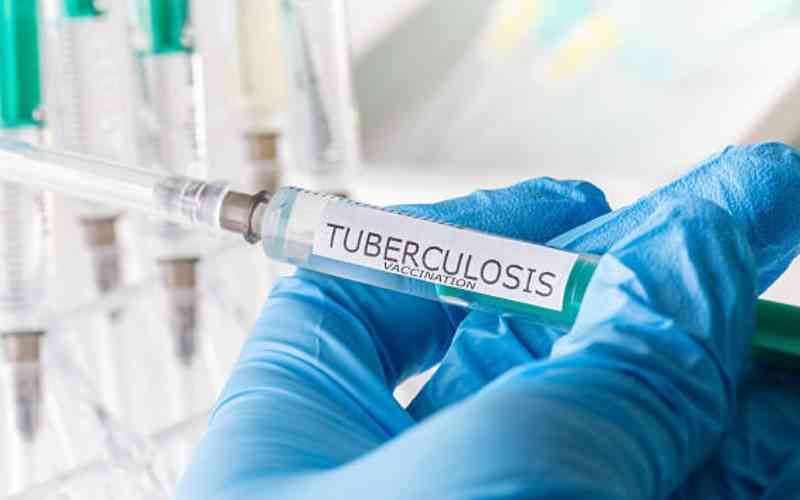
Kenya is likely to lose gains made in the fight against Tuberculosis (TB), a leading infectious disease, following an acute shortage of drugs.
According to sources, the nationwide shortage has been experienced in the past six months.
Evelyn Kibuchi, head of Stop TB Partnership, said the shortage risks more new infections as newly diagnosed patients are not put on treatment.
Kibuchi said the Kenya Medical Supplies Authority (Kemsa) distributed 7,000 packs of TB drugs last week on Friday across the country. This will only serve 7,000 patients.
With 133,000 TB patients in the country, the shortage is a worrying concern. One pack serves one patient for only 28 days.
With the shortage, patients are forced to share drugs, with some defaulting risking the development of multi-drug resistant TB.
"Facilities across the country are getting fewer packs as compared to the number of patients on medication. Any new patients testing for TB is asked to wait, an issue likely to cause more infections because they continue to interact with masses, yet TB is highly infectious," said Kibuchi.
Due to the biting shortage, counties are giving priority to hospitals with high-burden of treating TB.
- Four dead, 34 hospitalised as cholera spreads in Narok county
- TB program officers protest over 16 months' salary arrears, employment terms
- State steps up fight as pneumonia kills thousands of children annually
- Why the deadly typhoid outbreak in Sudan could spill over to Kenya
Keep Reading
Dr Andrew Mulwa, the KEMSA CEO, admitted that the country has been having a shortage of TB drugs.
He said Kemsa received 7,000 packs last week, and 14,000 packs are expected at the end of the week.
"In August, we ran short of TB drugs because of a change in the global supply chain. We had a supplier who was to supply 8,000 packs but he did not," said Dr Mulwa.
The CEO said the Agency expects at least 14,000 packs weekly which will cushion against the shortage.
TB is among Kenya's top three killer diseases, alongside malaria and HIV/AIDS.
Kenya is ranked fourth in Africa with the highest TB burden after South Africa, Nigeria, and Ethiopia.
In 2020, Kenya recorded a total of 72,943 TB cases, 5,663 of these were paediatric cases.
According to Kenya Demographic Survey (KDHS) 2022 report, 12,000 people are infected with TB every year, while 32,000 die of TB annually.
In 2019, Kenya reported 31,000 TB deaths, a number that significantly reduced to 21,000 in 2022.
A drop in deaths made Kenya to be ranked among the top seven countries that have managed to meet Sustainable Development Goals (SDGs) 2020/22 TB targets.
TB is a communicable disease that spreads through the air when an infected person coughs, sneezes, speaks, laughs, or sings, and it spreads through coughs, sneezes, speaking, and laughs.
The disease presents with feelings of sickness or weakness, weight loss, fever, and night sweats, coughing and chest pain.
The Ministry of Health (MoH) through the National Tuberculosis, Leprosy and Lung Programme (NTLD-P) has made significant progress toward the prevention and treatment of TB, towards ending the TB epidemic by 2030, according to health targets of the United Nations Sustainable Development Goals (SDGs).
To avoid losing gains made in the fight against the disease, Kibuchi has urged the government to develop a sustainable supply of TB drugs.
"At no point should we have an interruption supply of TB drugs. No patient should be diagnosed and miss drugs, or default because of lack of supply," said Kibuchi.
"TB should be treated like an emergency to avoid deaths," she added.
Further, the head of STOP TB asked the government to allocate more funding to the TB programme.
Alongside malaria and HIV/AIDS, TB heavily depends on donor support and funding which is supposed to come to an end in 2027 as donors pull out after Kenya moved from a low-income to a middle-income country.
Among the progress made in the war against TB include expansion and strengthening access to the TB diagnostic network and services through the introduction of high-end diagnostic equipment.
The country has also introduced Digital Adherence Technology in support of drug adherence and providing preventative treatment for people at high risk of contracting TB.
 The Standard Group Plc is a multi-media organization with investments in media
platforms spanning newspaper print
operations, television, radio broadcasting, digital and online services. The
Standard Group is recognized as a
leading multi-media house in Kenya with a key influence in matters of national
and international interest.
The Standard Group Plc is a multi-media organization with investments in media
platforms spanning newspaper print
operations, television, radio broadcasting, digital and online services. The
Standard Group is recognized as a
leading multi-media house in Kenya with a key influence in matters of national
and international interest.











